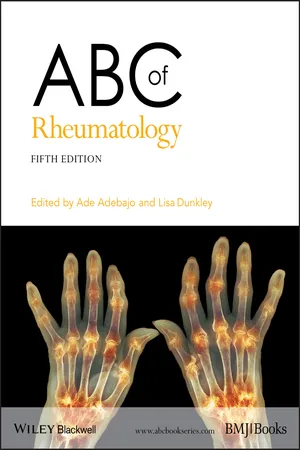
- English
- ePUB (mobile friendly)
- Available on iOS & Android
ABC of Rheumatology
About this book
ABC of Rheumatology continues to be a practical and informative guide to the assessment, treatment and management of common rheumatic and musculoskeletal conditions within primary care.
Fully updated to reflect developments in this fast growing field, the fifth edition covers overviews of all key areas of rheumatology, and includes new chapters on radiology and immunology, as well as expanded coverage on metabolic bone disease, chronic widespread pain, and complex regional pain syndrome.
Featuring highly illustrated chapters, boxed summaries and links to further resources, ABC of Rheumatology is an accessible reference for all primary care health professional, general practitioners, family physicians, junior doctors, medical students and nurses.
Frequently asked questions
- Essential is ideal for learners and professionals who enjoy exploring a wide range of subjects. Access the Essential Library with 800,000+ trusted titles and best-sellers across business, personal growth, and the humanities. Includes unlimited reading time and Standard Read Aloud voice.
- Complete: Perfect for advanced learners and researchers needing full, unrestricted access. Unlock 1.4M+ books across hundreds of subjects, including academic and specialized titles. The Complete Plan also includes advanced features like Premium Read Aloud and Research Assistant.
Please note we cannot support devices running on iOS 13 and Android 7 or earlier. Learn more about using the app.
Information
CHAPTER 1
Delivering Musculoskeletal Care Across Boundaries
OVERVIEW
- The burden of musculoskeletal disease is increasing and the importance of a multidisciplinary care pathway in the management of these patients is well established.
- A community‐wide approach encompassing the involvement and education of both patient and primary care physician will lead to earlier diagnosis, speedier and more appropriate secondary care referrals, and quicker treatment and ultimately improved clinical outcomes.
- Innovative models of care have been developed within primary/secondary care interface services for patients with musculoskeletal disease.
- Identifying patients with inflammatory arthritis for rapid secondary care referral remains a key challenge for primary care.
Introduction
Rheumatology in the community: the impact on primary care
Who should be referred to secondary care?
Box 1.1 Important information to include in a referral letter
- Length of history
- Pattern of joint involvement
- The presence of joint swelling and/or stiffness
- Referrals for and response to previous treatments
- Results of investigations
- Distress or disability – results of screening tools such as STarT Back
- Significant co‐morbidity and risk factors
- Other medical and psychosocial issues
Box 1.2 The STarTBack tool for back pain
| Questions 1–8: tick box for agree/disagree | No | Yes |
| 1 My back pain has spread down my leg(s) at some time in the last 2 we... |
Table of contents
- Cover
- Title Page
- Table of Contents
- Preface
- Contributors
- List of Abbreviations
- CHAPTER 1: Delivering Musculoskeletal Care Across Boundaries
- CHAPTER 2: Pain in the Wrist and Hand
- CHAPTER 3: Pain in the Neck, Shoulder and Arm
- CHAPTER 4: Low Back Pain
- CHAPTER 5: Pain in the Hip
- CHAPTER 6: Pain in the Knee
- CHAPTER 7: Pain in the Foot
- CHAPTER 8: Fibromyalgia Syndrome and Chronic Widespread Pain
- CHAPTER 9: Osteoarthritis
- CHAPTER 10: Gout, Hyperuricaemia and Crystal Arthritis
- CHAPTER 11: Osteoporosis and Metabolic Bone Disease
- CHAPTER 12: Rheumatoid Arthritis
- CHAPTER 13: Treatment of Rheumatoid Arthritis
- CHAPTER 14: Spondyloarthritides
- CHAPTER 15: Juvenile Idiopathic Arthritis
- CHAPTER 16: Musculoskeletal Disorders in Children and Adolescents
- Chapter 17: Polymyalgia Rheumatica and Giant Cell Arteritis
- CHAPTER 18: Systemic Lupus Erythematosus and Lupus‐Like Syndromes
- CHAPTER 19: Raynaud’s Phenomenon and Scleroderma
- Chapter 20: Reflex Sympathetic Dystrophy
- CHAPTER 21: Is It an Autoimmune Rheumatic Disease?
- CHAPTER 22: Sport and Exercise Medicine
- CHAPTER 23: Vasculitis and Related Rashes
- Chapter 24: Basic Immunology and the Biologic Era
- Chapter 25: Laboratory Tests
- Chapter 26: Musculoskeletal Radiology
- Chapter 27: The Team Approach
- Chapter 28: Epidemiology of the Rheumatic Diseases
- Index
- End User License Agreement